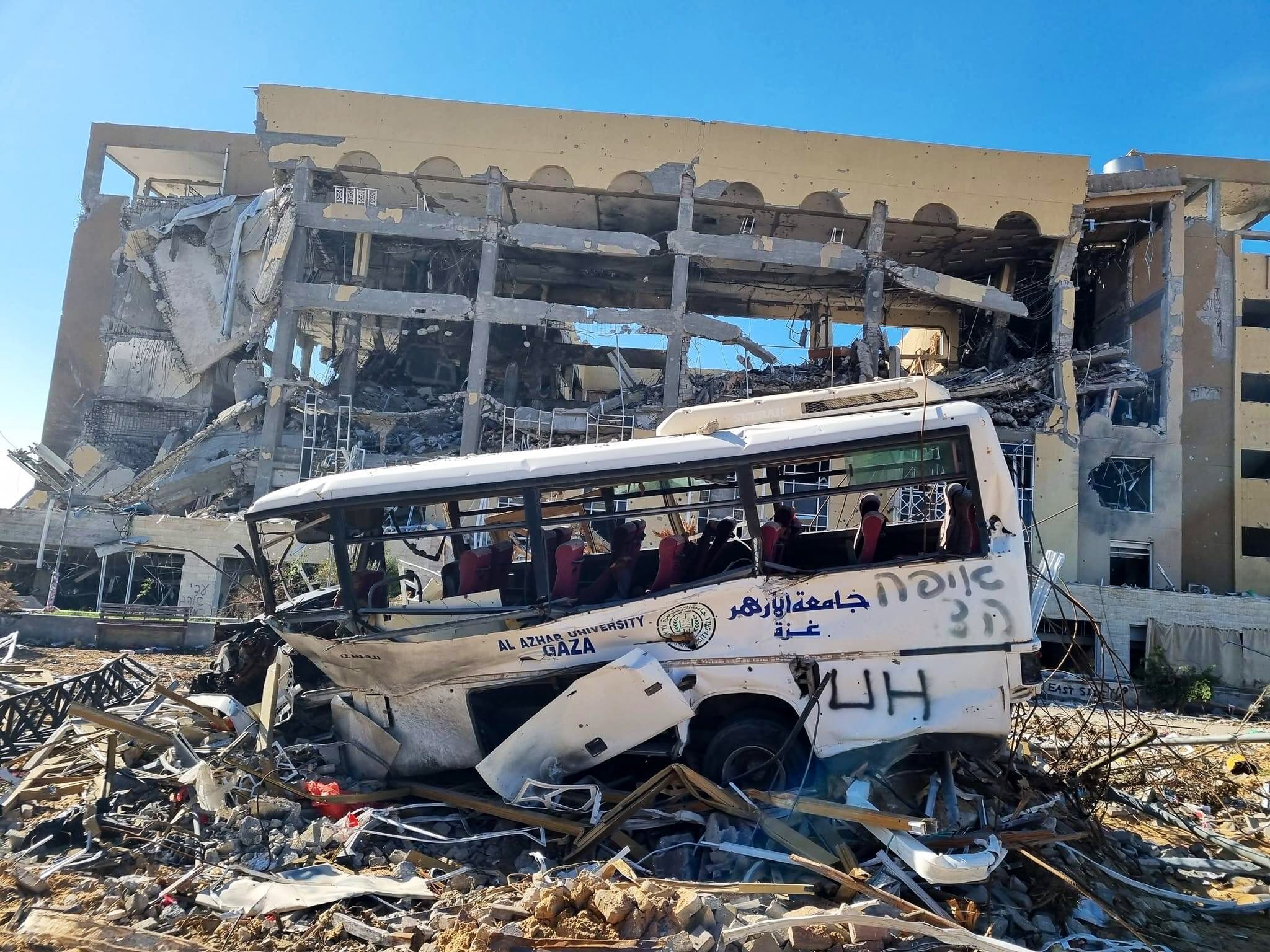
In their war on Gaza, the Israelis pulverized the educational sector in the enclave. There are no schools, no colleges and no universities due to the mass bombs deliberately targeting these institutions since 7 October, 2023.
Over 90,000 Palestinian university students in Gaza have no universities to go back to when the war ends.
Israel’s bombings have turned all of the 12 universities in the Strip into piles of rubble, campuses are a wreck, student lecture halls no longer exists, tumbledown buildings have become the standard textbook case of woes and misery underlined by running sewers and dirty water floods.
Besides, the mass attack on the higher educational system by Israeli warplanes targetted and killed nearly 100 Palestinian scholars, deans, scientists and professors, calling this criminal rampage as scholastide with the Israeli intention of destroying the whole system of education in the Gaza Strip as UN experts pointed out.
To demonstrate his outrage, Palestinian-American Dr Tariq Haddad refused to meet US Secretary Anthony Blinken after Israel killed 100 people from his family in its Gaza genocide. Among his family, included physicians and professors who were murdered wantonly.
The attack on the universities was deliberate attempt to destroy Palestinian culture and learning. Al-Aqsa University in Khan Yunis, in the south of the Gaza Strip, was completely decimated, made dysfunctional by an Israeli regime that has long forgotten knowledge culture and civilization.
Al Aqsa University began to be destroyed slowly since the end of 2023. As Palestinians started to move in search of safe areas, they found Al Aqsa University. It had been turned into a place for the thousends of displaced people being forced out of their homes by Israeli warplanes.
Once the Israeli army started to hear of that, they increased the bombing of this institution accomplanied by carnage, killing and mayhem.
The same is the case with the Islamic University in Gaza which was completely destroyed by the Israeli occupation forces.
The Islamic University was the biggest educational learning in Gaza, yet all of its faculties were completely destroyed soon after 7 October.
There are plenty of pictures that show “before and after” – a horrendous, vicious attack on educational learning.
One Israel soldier relished his destructive work so much, decided to film himself walking through Al Azhar University which is now lie in a desolate, dilapidated state.
In a mock display, he walks among its ruins, saying the university is now closed for reconstruction and asking the Israeli soldiers who have now come to occupy its wrecked and debris-ridden halls, if they want to sign up for the new semester.
In rememberance of their destructions, Middle East Eye ran a piece on those higher learnings that once existed. Besides the Islamic University of Gaza and the Aqsa University, there was Al Israa University, Al Azhar University, Palestine Technical College, University College of Applied Sciences, University of Palestine, Gaza University, Hassan II University of Agriculture and Environmental Sciences and Dar Al Kalima University.
But there all gone now. US Congressman Bernie Sanders tries to emphasize the point across to the US Senate about student protesters in US university campasses for the support of Palestine. He told Senators in Gaza there are no student protesters because every one of the 12 campuses there were destroyed by the Israelis.
Another Israeli soldier found it appropriate to take a selfie of himself behind a book shelves in Al Aqsa University which he just set on fire.
The rampage of the University which is located in Khan Younis, to the South of Gaza City, was second largest city in Gaza, occupied for the best part of three months by the Israeli army in a bid to get rid of Hamas and Palestinian resistance fighters.
Israeli soldiers gave up last April and left. They hadn’t destroyed the resistance, but what they decimated Khan Younis, its university, colleges and schools. It was pure terroristic vandalism.
The photo of the Israeli soldier went viral. It shows him holding a book while a fire burns behind him in the Al Aqsa University library that is one of the largest book depositories in the Gaza Strip.
Despite the killing of its doctors, nurses, computer scientists, engineers, teachers, lectures, workers, journalists and many other professions, Palestinians are still hopeful about the “day after” when the war will end.
The image of 21-year-old Duaa from deep down Gaza is heartening. It is a call for the outside world to let her continue her studies despite the fact “…we are living in a state of occupation war that destroyed my home, my country, and my university…” she said.
And there are many like her which means the destroyed universities will be rebuilt one day and the educational system will be rebuilt and reconstituted despite the Israeli slaughter because Palestinians will not go anywhere accept stay in Gaza.

 (@madrelake)
(@madrelake) 
 . This is what they're reporting meanwhile we're seeing video footage of eliminated Israeli soldiers being wheeled out of Rafah daily. Stop lying…. you're completely losing the ground battle & Trump is now begging for a ceasefire.
. This is what they're reporting meanwhile we're seeing video footage of eliminated Israeli soldiers being wheeled out of Rafah daily. Stop lying…. you're completely losing the ground battle & Trump is now begging for a ceasefire. 
 Houthis:
Houthis:


